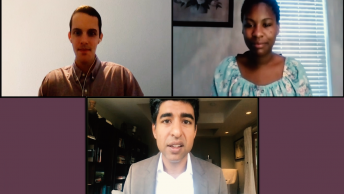I never tire of reading, watching, or hearing about maternal and child health because the topics are so prolific and broad. Maternal and child health is about employment and policy. It’s about social support. It’s about racism. It’s about public safety. It’s about bodily autonomy and liberty. The list continues, but I digress. The tone of maternal and child health similarly differs considerably – some media on the topic can be gloomy and fearful while other media are celebratory and progressive. We hope to focus on the latter while drawing attention to the systems that perpetuate the former as well as strategies to address them.
I asked my colleagues at Ariadne Labs to share resources that have shaped their perspectives on their work and/or personal experiences in maternal and child health. I’m still working my way through their fantastic recommendations, and I hope this list whets your appetite for what’s to come. Please join the conversation – follow us on social media or email us at info@expectingmore.org and let us know what you want to hear about!
We look forward to hearing from you!
– Jocie
Articles & Books
Dead Aid by Dambisa Moyo
The book argues that aid isn’t the right approach to development. Aid addresses the symptom, not the cause of underdevelopment. The same lessons apply here in the US, if we don’t address the cause of so many of the inequalities in maternal and newborn health, institutional racism, our efforts to avert the resulting problems won’t fully succeed.
– Lauren Bobanski, Program Manager
Designing for women
- “Why aren’t we designing cities that work for women not just men”
- “What would cities look like if they were designed by mothers?”
- “From ADHD to endometriosis, women are often misdiagnosed. Why? The world was made for men”
These articles highlight how often women and mothers have not been included or considered in the design of so many of the basic structures that form the foundations of our lives and our health. It represents both a major failing of our society to date and also highlights a major opportunity for systematic, structural improvement. There are also important parallels to the lack of consideration of racially diverse end users in much research and design (e.g. recent articles on sunscreen and consumer fitness trackers for people of color).
– Avery Plough, Research Specialist
ProPublica’s “Lost Mothers” series
Though I am not an obstetrician/gynecologist, many of my primary care patients at a community health center in an underserved and racially-diverse neighborhood of Boston are young women who are considering pregnancy or already have experienced childbirth in America. Therefore, ProPublica and NPR’s story on racial disparities in maternal mortality that began with the tragic story of Shalon Irving really struck a chord with me. Clearly, there are countless systemic and policy-level interventions that are necessary. Nevertheless, I realized that one of the best things I could do was to build trust and provide respect and compassion to the women visiting me in clinic and to set a precedent, if there was none, for others to follow. This past month, two Cape Verdean women with known uterine problems like endometriosis came to clinic with severe pelvic pain. The visits began with some tension with one woman curled up in her chair due to her pain. However, as we worked through a plan to manage the pain and get them treatment, I could feel there was a sense of relief that their ailments were being taken seriously and that we were partnering together to develop a plan that was medically appropriate but also resonant with their priorities and preferences. Though such interactions may be just a drop in the ocean, my hope is that groundbreaking journalism like ProPublica’s work will have far-reaching effects for maternal and child health in America by transforming how the medical system interacts with women long before, during, and after childbirth.
– June-Ho Kim, Fellow and primary care physician
Why America’s Black Mothers and Babies Are in a Life-or-Death Crisis
As someone interested in racial health disparities in health, I was blown away to see this type of coverage in a publication as mainstream as the NYT. The article took a refreshingly bold stance in proclaiming that the cause of the black maternal mortality crisis is the lived experience of being a black woman in America, burdened by the double-bind of racism and gender discrimination.
– Katie Breen, Intern on Delivery Decisions Initiative and MPH student
Podcasts
New York Times Daily podcast’s episode on black maternal mortality
This podcast wove together data/ trends with the story of a woman and her two births in a way that was memorable and compelling. It made me keenly aware of communication failures, dangerous assumptions and biases, and other factors contributing to a mother’s care experience and outcomes – especially when I became a patient advocate/ buddy at Tufts Medical Center. The things I’d heard about in the podcast were very real, and as a provider in training, it pushed me to consider how I would navigate some of these challenges and deliver human-centered care.
– Kinjal Vasavada, Intern on the Innovation Platform and medical student
Rough Translation: The Congo we listen to
The podcast explores a situation where a well-known headline doesn’t quite get the story right. Or at least it isn’t a full picture of the story. It makes me think about all of the headlines in the US about maternal mortality now, American women twice as likely to die in childbirth as their mothers were, the numbers are even more horrifying for African American women. But the realities behind those numbers are more complicated. Contributing factors to increasing maternal mortality in the US runs the gamut, racism, poor mental health care, fragmented care, etc.
– Lauren Bobanski, Program Manager
The Wonder of Parenting: A Brain Science Approach to Parenting
They take a scientific (Neuroscience, hormonal, developmental) approach to explain a child’s behavior and engagement with regular life events.
– Nic Encina, Director of Science & Technology Platform and new dad
TV & Video
Charles Johnson’s speech at the March for Moms
Charles describes his experience of losing his wife in childbirth because the clinical team did not listen to them, a black couple. His deeply personal story and clear call to action for policymakers guides my work in advocating for maternal health policy change every day. We must listen to, and center, the experiences of families in America as we demand change to ensure dignity and safety for all.
– Katie Barrett, Executive Director March for Moms
Giving Birth in America (Every Mother Counts/CNN)
Every Mother Counts and CNN have partnered to put together a brilliant series of short documentaries that depict the American way of life through the eyes of expecting families and those who care for them. They anchor each documentary it a different region of the country and showcase what is ultimately a hopeful view of the opportunity we have to make sure families can grow with dignity.
– Neel Shah, Director of Delivery Decisions Initiative
“An Open Letter to the Protesters Outside the Planned Parenthood Near My Job” by Elizabeth Acevedo
This poem has been extremely influential for me in developing my understanding of reproductive justice. It speaks to the fact that black women and white women have always needed to conceptualize reproductive rights differently throughout history. Acevedo also highlights how reproductive justice goes beyond just having a safe pregnancy and includes economic justice, abortion access, safe communities, freedom from police violence, and many other factors. She ends by speaking to the resistance and resilience of black women, which I always appreciate as a black woman.
– Gwendolyn Wallace, Intern and undergraduate student
Workin’ Moms (Netflix)
Workin’ Moms has been influential in how I’ve thought about social support given to families in the postpartum period and through the child’s first couple years of life. The show centers around a mothers’ group and begins when each of their children are about 8 months old, when some of the moms are about to re-enter the workforce. It took me two or three episodes to realize that the setting of the show – the magical land where mothers have eight months (eight months!!) to spend with their new babies before choosing between career and family – is Canada.
The timing of the show has corresponded well with the timing of many of my friends becoming parents for the first time. I’ve seen them navigate the difficult terrain of choosing between their careers and family obligations. They’ve all battled with varying levels of isolation during the postpartum period and have been frustrated with inequitable family leave between new moms and dads. While the mothers of Workin’ Moms have eight months of family leave, my friends had between four and eight weeks of paid leave. Their spouses have an average of two weeks. This discrepancy makes new moms the defacto project managers of their child and home because they become the “expert” and their spouse looks to them for instruction on how to care for their child. Some of my friends dropped out of the workforce because they did not feel their workplaces offered enough leave, compensation, and/or flexibility to stay.
While my previous work has focused on the increasing access to antenatal care and institutional deliveries, my friends’ experiences and Workin’ Moms has made me want to work towards policy change to support families in the child’s first couple years of life.
– Lauren Spigel, Qualitative Specialist


